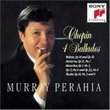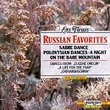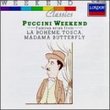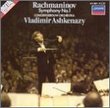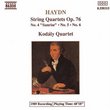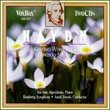| All Artists: Charles Gounod, Jerry Hadley, Cecilia Gasdia, Samuel Ramey, Suzanne Mentzer, Alexandru Agache, Brigitte Fassbaender, Philippe Fourcade, Welsh National Opera, Carlo Rizzi Title: Gounod - Faust / Hadley, Gasdia, Ramey, Mentzer, Agache, Fassbaender, WNO, Rizzi Members Wishing: 0 Total Copies: 0 Label: Teldec Release Date: 5/31/1994 Genre: Classical Style: Opera & Classical Vocal Number of Discs: 3 SwapaCD Credits: 3 UPC: 745099087227 |
Search - Charles Gounod, Jerry Hadley, Cecilia Gasdia :: Gounod - Faust / Hadley, Gasdia, Ramey, Mentzer, Agache, Fassbaender, WNO, Rizzi
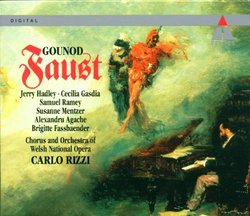 | Charles Gounod, Jerry Hadley, Cecilia Gasdia Gounod - Faust / Hadley, Gasdia, Ramey, Mentzer, Agache, Fassbaender, WNO, Rizzi Genre: Classical
|
Larger Image |
CD DetailsSimilarly Requested CDs |
CD ReviewsFaust as it was meant to be madamemusico | Cincinnati, Ohio USA | 03/28/2003 (5 out of 5 stars) "Gounod's "Faust," which premiered in 1859, is the oldest French opera to remain in the standard repertoire from that time to this. Even from the beginning, there were complaints about its length, its pacing (generally slow), the uneven quality of the music and the many liberties that Gounod and his librettists took with Goethe; and yet it has persisted.At the turn of the previous century, however, there was a very different performance style for "Faust", a style which included elegance, meaningful singing acting in which the lyrics were interpreted as well as sung, and an ensemble style in which singers did their best to blend and make the trios or quartets sound better than the sum of their parts. This was the era of Christine Nilsson, Suzanne Adams, Edmond Clement, Charles Dalmores, Pol Plançon and Marcel Journet, represented on recordings only in the form of imperfect, abbreviated excerpts recorded via the acoustic process.Here, however, we are faced-for the first time in my lifetime, which began in 1951-with a performance of "Faust" that obeys the musical directions of its composer while reviving the old French style of singing, combined with the more modern emphasis on superb orchestral playing and choral balance. The result is a performance that engrosses the listener from start to finish, though it does not help the slow pacing or uneven musical quality much. The long, opening scene with Faust is sung beautifully and meaningfully by Jerry Hadley, yet its music still sounds to me too much like mere filler, and even the bright, beautiful voice of Cecilia Gasdia cannot give the ballad of "Le Roi de Thule" any life or interest.From the very start, Hadley sings with such an exceptional legato and musical continuity that one is continually startled to discover how good the music sounds; and at every turn he gives the right dramatic emphasis to the words he is singing. Thus he sounds anguished and bitter in the opening, astonished at the entrance of Mephistopheles and desperately in love with Marguerite when singing "Salut, demeure chaste et pure." He also takes the high C in this aria, as well as the one near the end of Act One, softly as the composer directed and not just belted out as most tenors do. And in the love duet with Gasdia in Act Two, both of them sing with such a gentle fervor and remarkable sense of line that they make the music sound like Delibes' "Lakme."Gasdia is equally impressive, sounding shy yet attracted to Faust at their first meeting, genuinely delighted at the casket of jewels, emotionally committed in the love duet and fearful in the Church Scene. She has a marvelous trill and a pliant, bright timbre that more than once put me in mind of Geraldine Farrar.Alexandru Agache's Valentin is remarkable in a different way, for he manages to bring this cardboard character to life in a way I have not heard accomplished before. Even such great baritones as Jean Borthayre really just "sang" the music, and even the slight amount of drama injected into Valentin's death scene generally sounded stagey and artificial; but here, every note, every word that Agache sings sounds as natural as speech and down-to-earth natural-a remarkable feat of illusion.Brigitte Fassbaender's Marthe is the best-sung since Rita Gorr guested on the old de los Angeles-Gedda-Blanc-Christoff set, and in my opinion actually funnier because you can hear her trying to make time with the devil. Suzanne Mentzer's Siebel, though sung and acted well, seems a bit too ripe in vibrato for my taste, but in a performance of this quality it doesn't matter that much.Samuel Ramey's Mephistopheles is a clever combination of the old Journet elegance with some of the Ghiaurov-styled power. Unlike Plançon or Journet, he does not possess a trill, and this sometimes disappoints, yet his characterization is so much more vivid, and more vividly realized, than almost anyone since Journet places him far ahead of his competition (such as José van Dam on the Plasson set, who sounds about as interesting as a chartered accountant). He is menacing when he should be, but also sly or funny at times, and though his side chuckles are not as genuinely funny as Journet's he at least attempts them. He is also in fairly good voice for his age, better in fact than his Pimen on the excellent Abbado recording of "Boris Godunov."Yet the real star of this recording is conductor Carlo Rizzi. He doesn't just pace and shape the music well; he makes his orchestra sing and sigh, laugh and love, along with the characters, in such a subtle way that one is well into the opera before one realizes just what he is doing and how good it sounds. In his performance, then, the orchestra becomes a partner in the unfolding of the musical drama, not just a backdrop for the singers to belt out their lines. This is a subtle thing, and one that may escape a less sensitive listener at first, but once one realizes what he is doing (I caught on about the time of "Avant de quitter"), it becomes one of the most enjoyable aspects of the performance. In addition, he avoids making such "formula" pieces as "Vin ou biere" and the Soldier's Chorus sounds like rat-a-tat set pieces to just crunch along, imbuing them with a musical elegance that is entirely in keeping with the French style.So, here we have a "Faust" with an American mezzo, tenor and bass, another mezzo who is German, a Rumanian baritone and an Italian soprano and conductor, yet somehow it sounds much more French than the old Henri Busser recording (Journet's Mephistopheles notwithstanding) or either of the Cluytens versions. For this we should be grateful, as this performance has raised the standard to such an exalted level that it will probably be another century before others may surpass it." Best available performance of a truly great opera. D. R. Schryer | Poquoson, VA United States | 09/26/2000 (5 out of 5 stars) "Let me state quite candidly that, for my taste, Faust is the greatest opera ever written. For several decades it was also the most popular. Unfortunately, Faust has lost some popularity in recent years; but, nevertheless, it remains a masterpiece. Because I view this opera as so uniquely outstanding, I have never heard a performance of it that I considered to fully do it justice. This recording, despite a few minor reservations on my part, is the finest all-around performance of Faust I've heard so far. Hadley and Gasdia are quite good and Ramey is outstanding. There are times when Rizzi's tempos are somewhat unusual but, overall, I find his conducting considerably above average. No definitive performance of Faust exists yet but this one comes very close. If you're familiar with Faust, I think you'll like this recording. If you're not familiar with Faust, please correct that situation as soon as possible by buying this recording." Extremely good Faust! J. Luis Juarez Echenique | Mexico City | 12/31/1999 (5 out of 5 stars) "This recording was a big and pleasant surprise. Of course everyone expected a "good" demon from Samuel Ramey, but Jerry Hadley and especially Cecilia Gasdia, turned out unbelievably good performances. Hadley sings a very idiomatic Faust, suave and elegant in the best French tradition. I liked him much more in this opera, than in the Italian repertoire. Cecilia Gasdia is if anything, even better. What a gloriously ravishing Margheritte she sings! She has to be heard to be believed. I love Victoria de los Angeles and Mirella Freni, but this incredible Italian soprano, is just exquisite. Ramey is sonorous and commanding, if just a little bit dull, more fun can be had with Mephistopheles. Everyone else in the cast is excellent, including the Romanian Valentin. Carlo Rizzi conducts a rather slow performance, but very loving and not without excitement. Since this recording was released a few years ago, it's the one I most often hear."
|

 Track Listings (21) - Disc #1
Track Listings (21) - Disc #1
